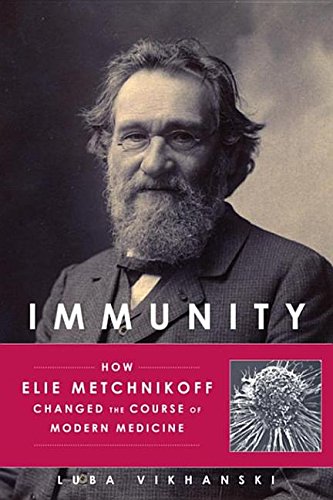
Immunity
How Elie Metchnikoff Changed the Course of Modern Medicine
فرمت کتاب
ebook
تاریخ انتشار
2016
نویسنده
Luba Vikhanskiناشر
Chicago Review Pressشابک
9781613731130
کتاب های مرتبط
- اطلاعات
- نقد و بررسی
- دیدگاه کاربران
نقد و بررسی

February 1, 2016
A resurrection of the life of "one of the founding fathers of immunology," Elie Metchnikoff (1845-1916). Vikhanski (In Search of the Lost Cord: Solving the Mystery of Spinal Cord Regeneration, 2001, etc.), a Russian-born, Israel-based science journalist, was initially dismissive of the achievements of the Ukrainian-born scientist, depicted as a great Russian hero in her school texts, a depiction she thought was merely Soviet propaganda. What she discovered sheds light on a critical period in medical and cultural history. Germ theory advanced greatly under Louis Pasteur in France and Robert Koch in Germany, and vaccines and serum treatments were developed to prevent or cure disease. Yet next to nothing was known about the body's natural defenses. Enter Metchnikoff, a zoologist and fervent Darwinian who believed the study of simple organisms could reveal protective mechanisms that would be preserved in higher forms of life. His great epiphany occurred when he used rose thorns to invade the body of a transparent marine organism and, under the microscope, saw the mobilization of cells that engulfed and chewed up the thorns. He called them phagocytes (cell-eaters) and declared them the body's chief defenders. Meanwhile, scientists in Germany had discovered antibodies. The resulting "Immunity War" pitted French scientists at the Pasteur Institute (where Metchnikoff settled for the remainder of his career) against the Germans. Eventually, the war waned, and Metchnikoff and Paul Ehrlich were jointly awarded a Nobel Prize. Only much later did scientists realize that Metchnikoff's phagocytes reflected "innate immunity," an evolutionarily older defense system compared to the "adaptive immunity" represented by antibodies. Metchnikoff went on to develop theories of aging and ideas about gut microbes that spawned a global yogurt revolution. As Vikhanski richly illustrates, Metchnikoff did everything with passion, in both his professional and personal lives. A portrait that captures not only the man, but also the end-of-the-19th-century dynamism that fostered revolutions in art, politics, and science.
COPYRIGHT(2016) Kirkus Reviews, ALL RIGHTS RESERVED.

Starred review from April 1, 2016
In 1882, zoologist Elie Metchnikoff was observing primitive single-cell sea creatures when he had a thought: Could certain aggressive cells in the human body have evolved from these ancient predatory cells? Could the modern body's healing powers be related to a billion-year-old feeding mechanism? He placed a thorn in a starfish and waited. Sure enough, cells released from the starfish began engulfing and trying to "eat" the thorn. In that moment, Metchnikoff became the first immunologist. Science journalist Vikhanski (A Well-Informed Patient's Guide to Breast Surgery; In Search of the Lost Cord: Solving the Mystery of Spinal Cord Regeneration) wrings a suspenseful tale out of the life of this passionate Russian, who saw hundreds of millions of years of evolution in a drop of seawater. The writing is by turns eloquent and exuberant, as she details both the skepticism over and the wonder inspired by the evolving science. Once forgotten, Metchnikoff's work is being revived, now seen as describing one of the immune system's two key arms: the "innate" arm. VERDICT This book deftly unspools and celebrates both the profession and the personal life of a turn-of-the-century giant. It should appeal to students from high school through grad school and beyond.--Cynthia Fox, Brooklyn
Copyright 2016 Library Journal, LLC Used with permission.

























دیدگاه کاربران